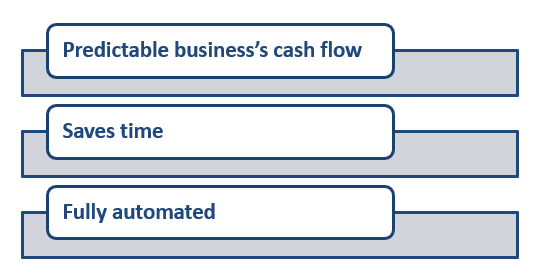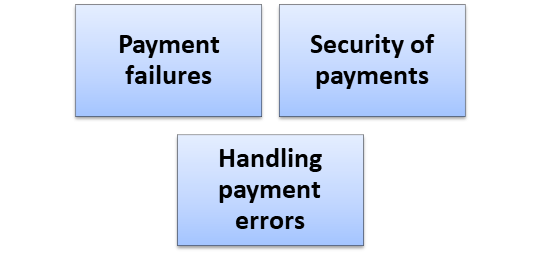Recurring Billing
Updated on 2023-08-29T11:57:23.405816Z
What is Recurring Billing?
Recurring billing refers to the bills that occur when a customer is charged by a merchant for goods or services automatically on a predetermined schedule. A business owner or merchant needs to get the permission from the customer and its information for recurring billing. Once a merchant or vender gets the customer’s permission and information, he or she can directly (automatically) make recurring charges to the account of a customer without any further permission. Recurring billing is also known as automatic bill payment.
Summary
- Recurring billing refers to the bills that occur when a customer is charged by a merchant for goods or services automatically on a predetermined schedule.
- A business owner or merchant needs to get the permission from the customer and its information for recurring billing.
- Recurring billing is also known as automatic bill payment.
Source: Copyright © 2021 Kalkine Media
Understanding Recurring Billing
Recurring billing provide the advantage of convenience for both a merchant and customer. Rather than of give billing information of a customer for repeated regular charges, the customer can allow the merchant or vendor to keep its payment details of file. By keeping the payment details or information about the customer the merchant can charge from the customer account every month for the service that is in effect or for the payment of agreed goods and service delivered by merchant for each time.
Generally, the payment option is decided by the business provider, some asked for checking or saving accounts while other providers may allow for credit card accounts too. Any customer who subscribes prearranged payments for goods and services on regular basis such as monthly is considered as a good candidate for recurring billing. For instance, gym membership fees, cable bills, magazine subscriptions, utility bills and cell phone bills.
Frequently Asked Questions (FAQs)
What are the types of Recurring Billing?
Recurring Billing can be divided into two types:
- Fixed Recurring Billing
Fixed recurring billing refers to a type of recurring billing where a fixed or same amount is collected by the merchant from its customer in each payment cycle like on monthly basis. Fixed recurring billing is used by those organizations who offer services with a fixed price such as a gym membership.
- Variable Recurring Billing
Variable recurring billing refers to a kind of recurring billing where a merchant charge or collect the different amount from the customer in each payment cycle. Variable recurring billing depends on the usage of product by a customer, where a new bill is created for each payment cycle. Variable recurring billing is categorised as usage-based billing and quantity-based billing. Usage-based billing is also known as metered billing, it is a kind of variable recurring billing where a merchant charges the customer based on its usage of the service such as the utility bills. Quantity-based billing is a kind of variable recurring billing where a customer is charged based on quantity bought by the customer such as volume-based cloud storage services.
What are the merits of Recurring Billing?
Recurring billing is beneficial for both the merchants/vendors or customers. Some notable advantages are:

Source: Copyright © 2021 Kalkine Media
- Predictable business’s cash flow: Recurring billing offers a reliable and consistent cash flow for a company. Recurring billing helps the owner of company to forecast the revenue that will be produced in a particular time frame.
- Saves time: Recurring billing is beneficial as it saves the time for both the owner of a business and customer as with the recurring billing system customers require to provide their information for payment once and the merchant or vendor will charge for the delivered goods and services automatically. It helps to decrease the chances of non-payments and late payments.
- Fully automated: Recurring billing is fully automated process through which the business owner charges the customer for provided goods and services automatically on each payment cycle as the business owner already has the payment details of the customer.
What are the demerits of Recurring Billing?
Recurring Billing has various disadvantages too. Some of them are:

Source: Copyright © 2021 Kalkine Media
- Payment failures: Sometimes the business owner faces the payment failure due to various reasons such as incorrect card data, card expiration, and insufficient funds. Merchants or vendors have a plan in order to avoid these kinds of payment failures. Business owners may avoid these payments failure by using good subscription management tools.
- Security of payments: For every business, security of payment is very crucial. One of the biggest task for any business owner is that to protect the payment data of its customers in order to prevent from digital fraud. Subscription management tools are very helpful for implementing strong PCI compliance in order to protect the payment data as per the industry standards. Additionally, it also reduces the chances of payment frauds during the processing.
- Handling payment errors: There is another disadvantage. Business owners find it hard to handle the errors of payment. Sometimes, it is difficult for a merchant or vendor to notify the customers at the time of error occurs, specifically when the business owner has a strong and wide customer base. If a customer gets an error in recurring billing, the customers will face the trouble to correct a billing error.


